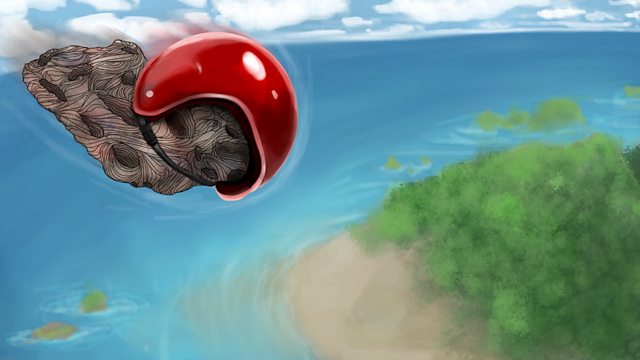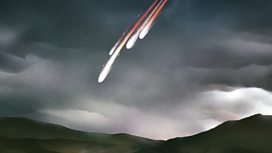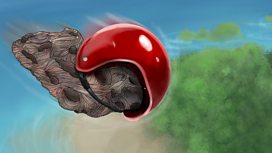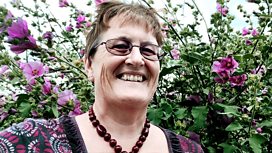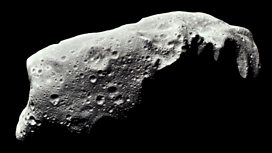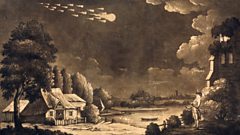Meteorites
Brett Westwood explores how the stones that have travelled from outer space have influenced our lives.
For thousands of years we have marvelled at the stones that fell from the sky. They were mysterious messages from the heavens; omens of luck and favour. Ancient Egyptians buried them in their tomb and Terry Pratchett put meteorite iron into his home made sword to enhance its mystical properties.
Myths and legends about meteorites abound in all cultures. In religious art they are visions in the sky foretelling of the apocalypse. Interest in them rocketed when it was finally accepted, as late as the 1970s that they did kill the dinosaurs, a scientific debate that took many years to settle and was hard fought. Meteorites are marvels; they are fragments of other worlds come to our home to remind us we are not alone and that above the sky there is a dynamic, restless universe.
Today people still believe meteorites contain magical minerals. The bizarre plants, Venus flytraps, only grow in the areas meteorites are found (by coincidence) and were thought to be plants brought down from another planet. We are all touched by the mystery of meteorites and today they are helping unravel the mysteries of our own solar system – and beyond.
Originally broadcast as a longer version on 4th August 2015
Original Producer : Sarah Pitt
Archive Producer : Andrew Dawes
Last on
![]()
From close encounters to Venus flytraps - 12 facts about meteorites.
![]()
The World According to Meteorite
A Natural Histories Comedy featuring Harriet Carmichael.
![]()
Desert Island Discs: Prof Monica Grady
Space scientist and meteorite expert, Prof Monica Grady, talks to Kirsty Young.
![]()
In Our Time: Asteroids
Melvyn Bragg and guests discuss the unique properties of asteroids.
Clips
-
![]()
The mystery of meteorites
Duration: 03:31
-
![]()
Meteorite close encounters
Duration: 01:00
-
![]()
The World According to Meteorite
Duration: 01:15
Dr Caroline Smith

Her experience and expertise in curation and collections care has been recognised by the award of a prestigious Aurora Fellowship from the and consultancy work with industrial and academic partners studying and planning for future Solar System sample return missions.
In 2011, Caroline was selected as one of seven European scientists invited to participate in the planning for a proposed Mars exploration mission, where she provided input and advice related to sample curation and containment during collection, caching and on return to Earth. In 2014 she was chosen to be the UK representative for iMARS Phase 2 and was selected to be the Co-Chair of the Science Team.
Professor Mike Benton

He was elected for his fundamental contributions to understanding the history of life, particularly biodiversity fluctuations through time. He has led in integrating data from living and fossil organisms to generate phylogenies – solutions to the question of how major groups originated and diversified through time.
This approach has revolutionised our understanding of major questions, including the relative roles of intrinsic and extrinsic factors on the history of life, whether diversity reaches saturation, the significance of mass extinctions, and how major clades radiate.
Brother Guy Consolmagno

In 1996, he spent six weeks collecting meteorites with an NSF-sponsored team on the blue ice of Antarctica, and in 2000 he was honored by the for his contributions to the study of meteorites and asteroids with the naming of asteroid 4597 Consolmagno. Last year he received the from the for excellence in public communication in planetary sciences.
He has coauthored five astronomy books: “Turn Left at Orion”; “Worlds Apart”; “The Way to the Dwelling of Light”; “Brother Astronomer”; and “God's Mechanics”.
Beth Holtum

They share a love of geology, especially the historic finds from the Poldark and China Clay country that surrounds them, and a fascination for meteorites and impactites.
Dr Diane Johnson

She began working at the Open University in 2005 applying electron and ion beam microscopy to explore diverse research issues in Earth, planetary and space sciences. Diane has extensively analysed meteorites, space hardware, fossils and ancient cultural artefacts, publishing research papers in international peer reviewed journals and magazines. In 2009, a trip to Egypt inspired her to take up research into the influence of meteorite iron in ancient Egyptian culture.
Nick Johnson

He mentors trainees, students and apprentices; coordinates his team and is involved in many expeditions with Kew’s scientists. He trains international partners in nursery techniques to assist in conserving plants in their natural habitats.
Picture ©RBG Kew
Broadcasts
- Tue 4 Aug 2015 11:00������̳ Radio 4
- Mon 10 Aug 2015 21:00������̳ Radio 4
- Sun 2 Jul 2023 06:35������̳ Radio 4
